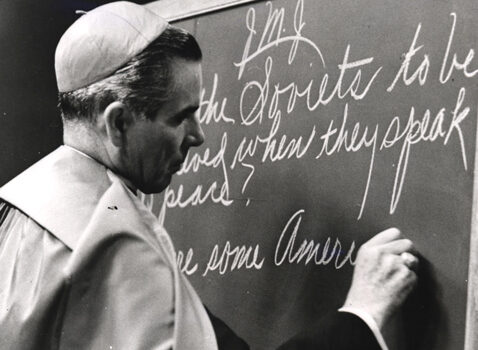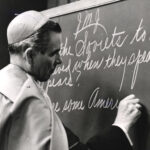Life is Worth Living was the title of Bishop Fulton J. Sheen’s immensely successful television program that debuted on February 12, 1952. Sheen changed the original title of the program, Is Life Worth Living? to its more positive sounding form. He later wrote a series of five books under his preferred title. No doubt he thought that the worthiness of living should not be a question, but a firm answer.
Today, whether life is worth living has once again become a question. When we consider the rise of suicides, the prevalence of abortion, and the increasing acceptance of euthanasia, Bishop Sheen’s original title is now very much in focus. A single example illustrates the point. Euthanasia was legalized in Canada in 2016 in response to a 2015 Supreme Court ruling that criminalizing euthanasia violated the Canadian Charter of Rights and Freedoms. Since its legalization, the number of euthanasia deaths has grown dramatically each year from 1,018 in 2016 to 10,064 in 2021. The latter figure represents an increase of 34.7% from the 7,446 deaths in 2020. These statistics were unimaginable back in 1952.
In his Choruses from The Rock, T. S. Eliot asks, “Where is the Life that we have lost in the living?” Paradoxically, it is a question that contains its own answer. The capital L refers to God. Although, according to the poet, people go through the motion of living, their life loses it worth, or its flavor when it is separated from God. Human beings do not seem to get the most out of their gifts. Eliot also asks: “Where is the wisdom we have lost in our knowledge? Where is the knowledge we have lost in information.” He concludes the first section of his poem by stating: “The cycles of Heaven in twenty centuries/ Bring us farther from God and nearer to Dust.”
Is life worth living? What other purpose does life have but to live it?” Poet Ricard Wilbur, one of the foremost American poets of the 20th century, states, “There is nothing to do with a day except to live it.” The day will bring unexpected difficulties and undeserved blessings, but when we live with courage and openness, we will find that life is, indeed, worth living.
The question “Is life worth living?” is tantamount to asking “Is a piano worth playing?” or “Is a car worth driving?” Life is worth living when it is lived fully, not when it is lived half-heartedly.
The Greeks has two words for life: bios, biological life, the pulse that we feel allowing us to live, and zoe, a higher form of life that transcends the isolated self and can be shared with others. This higher life allows us to participate not only in the lives of our neighbors, but also in the Life of God. Living solely for one’s self through acquisition, a quest for fame, and a desire to impress others, is a truncated life and is deprived of the richness that a zoe life can offer.
It has been calculated that loneliness is as dangerous to one’s health as smoking 12 packs of cigarettes a day. Loneliness is simply life without participation. In his book The Acting Person, Karol Woytyla (later Saint John Paul II) defined “participation” in an accurate, though challenging manner: “Participation corresponds to the person’s transcendence and integration in the action because . . . it allows man, when he acts together with other men, to realize thereby and at once the authentically personalistic value—the performance of the action and the fulfillment of himself in the action.”
As persons, we are both individualistic and communal. We would find it difficult to discover that life is worth living if we neglect the communal aspect of our being. Life may be difficult, but we should not underestimate the importance and even the therapeutic value of sharing our life with others.
Sister Mary Casey O’Connor is a member of the Sisters of Life, founded in 1991 by Cardinal O’Connor. She is devoted her twin sister, Casey Gunning, who has Down syndrome. Casey had something important to say at the first March for Life after the overturning of Doe v. Wade. She said to the multitude, drawing loud cheers, “I came from all the way from Colorado to announce to America and to the whole world that life is good and that life is a gift.” Her words should be an inspiration to everyone. Life, indeed, is worth living.













